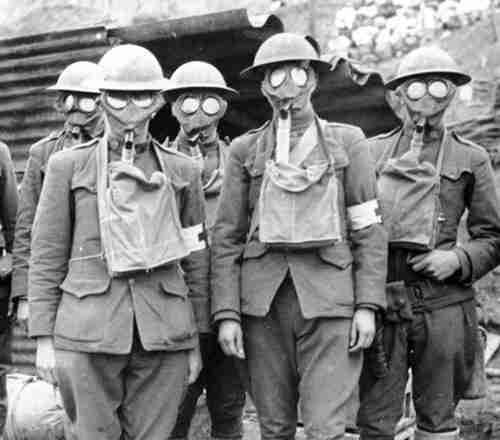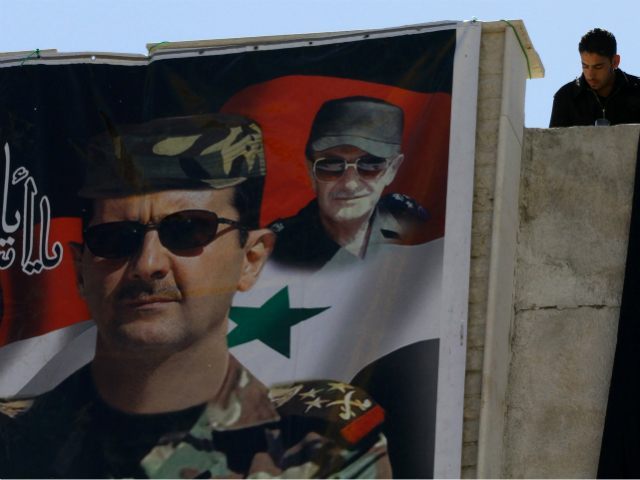This morning’s key headlines from GenerationalDynamics.com
- Russia and Iran send more troops to Syria to back faltering al-Assad
- Putin’s plan for Syria: al-Assad regime in anti-ISIS coalition with West
- Assad regime and ISIS are apparently BOTH now using chemical weapons in Syria
Russia and Iran send more troops to Syria to back faltering al-Assad

Preparing for mustard gas in World War One
Russia had been denying reports that Russia is building a new military base in Syria, but as usual, Russia’s denials were a total lie. Differing reports now indicate that Russia has already sent heavy weapons and dozens to hundreds of troops to Syria, though the buildup appears to be limited for the time being.
Russia’s Foreign Minister Sergei Lavrov now confirms that the huge Russian transport planes landing in an airport near Latakia, a port city on the Mediterranean, are carrying weapons and Russian servicemen. According to Lavrov:
If it’s necessary, we will act in full conformity with the Russian legislation, international law and our obligations, exclusively on the request and consent of the government of Syria and other countries of the region, if there is a talk about helping them fight terrorism.
Other reports confirm that two Russian Navy tank landing ships are moored at the Port of Tartus, also on the Mediterranean Sea, where the Russians have a naval base. According to the reports, the ships are offloading armored vehicles as well as nearly 50 Russian marines. The weapons and soldiers are arriving from Russia’s Sevastopol port in the Black Sea, in Crimea, which Russia invaded and annexed last year.
Further reports indicate that hundreds of troops from Iran’s élite Islamic Revolution Guards Corps (IRGC) have also arrived, and are deployed northwest of Damascus near the border with Lebanon.
The first reports that Iran was planning to deploy troops in Syria came several months ago. ( “5-Jun-15 World View — With Syria’s army nearing collapse, Iran plans massive troop deployment”.) That massive troop deployment appears to be occurring now. Fox News and Washington Post and Washington Free Beacon
Putin’s plan for Syria: al-Assad regime in anti-ISIS coalition with West
According to one analysis, Russia’s president Vladimir Putin does not really want to end up in a quagmire in Syria, but is using the threat of a massive Russian military deployment to Syria to blackmail the West into accepting “Putin’s plan” for Syria.
Putin’s plan would be to form a broad international coalition, targeting the so-called Islamic State (IS or ISIS or ISIL or Daesh). The all-inclusive anti-ISIS coalition would unite Syrian regime forces with Western forces and Russian forces against ISIS, and would receive a mandate from the United Nations General Assembly. Putin plans to address the UN General Assembly in mid-September, and may discuss the plan then.
The plan would mean that Western forces would join with Russia and Iran to prop up the regime of Syria’s president Bashar al-Assad, with the nominal objective of fighting ISIS. Russia’s power and military base in the Mideast would be firmly established, and the West could relieve Russia of the job of defeating ISIS and al-Qaeda linked Jabhat al-Nusra (al-Nusra Front), while Putin sat back and watched.
Some European leaders, including Italy’s former prime minister Silvio Berlusconi and France’s former president Nicolas Sarkozy, have expressed interest in the plan because it relieves tensions with Russia in Ukraine, and they would like to mediate a rapprochement.
From the point of view of Generational Dynamics, “Putin’s plan” is absolutely fascinating. I have been saying for ten years in the in the coming Clash of Civilizations world war, Iran, Russia and India would be allied with the United States and West, while the Sunni Muslim nations would be allied with China.
Ten years ago, that Generational Dynamics prediction seemed completely fantastical, but for the last couple of years we have seen in coming true, step by step. “Putin’s plan,” if adopted, would be a major step in bringing that prediction closer to reality.
Whatever else happens, there is absolutely no doubt that the Sunni nations, starting with Turkey and Saudi Arabia, would be infuriatedly opposed to any such plan for the West to align with Iran and al-Assad, who Sunni leaders consider to be existential threats to their countries. Jamestown
Assad regime and ISIS are apparently BOTH now using chemical weapons in Syria
Chemical weapons experts hired by the BBC have determined that both chlorine gas and mustard gas have been used in the conflict in Syria.
The chlorine was delivered by helicopters, according to witnesses, and only the regime of Bashar al-Assad has helicopters in Syria. The al-Assad regime has been for years using planes and helicopters to flatten entire villages, including innocent women and children, with barrel bombs loaded with explosives, metals, and chlorine gas dropped from helicopters. Al-Assad has also used deadly Sarin gas to hundreds of innocent civilians.
However, the mustard gas is something new in this latest conflict. It causes severe burning of the skin, eyes and respiratory tract, and can be absorbed into the body through inhalation, ingestion or by coming into contact with the skin or eyes. The agent reacts with water in skin cells and in the lungs to literally tear apart cellular structures. It can cause severe eye and lung damage and can also cause blindness. It was outlawed by international convention after World War I, but was used by Saddam Hussein in 1988 against the Kurds and some Iranians, killing over 10,000 people in possibly the worst chemical weapons disaster in history.
Germany’s foreign intelligence agency has collected evidence that it was ISIS jihadists that used mustard gas in an attack in Iraq. It is believed that the gas came from Saddam Hussein’s old stockpiles of mustard gas that he used in the 1988 attack, though it’s also possible that ISIS has manufactured the chemical weapon themselves.
On Thursday, the UN Security Council authorized an international investigative body to investigate the use of chemical weapons in Syria, and to establish who is responsible. The resolution has been pending for months, but had been opposed by Russia because Russia did not want an official finding that the al-Assad regime is responsible. It is not clear why the Russians changed their minds, but it may be because the use of mustard gas means that the use of chemical weapons is increasing. BBC and AP and International Business Times and AP
KEYS: Generational Dynamics, Syria, Russia, Latakia, Tartus, Sergei Lavrov, Vladimir Putin, Sevastopol, Crimea, Black Sea, Iran, Islamic Revolution Guards Corps, IRGC, Islamic State / of Iraq and Syria/Sham/the Levant, IS, ISIS, ISIL, Daesh, Italy, Silvio Berlusconi, France, Nicolas Sarkozy, Bashar al-Assad, chlorine, Sarin, mustard gas, UN Security Council
Permanent web link to this article
Receive daily World View columns by e-mail

COMMENTS
Please let us know if you're having issues with commenting.